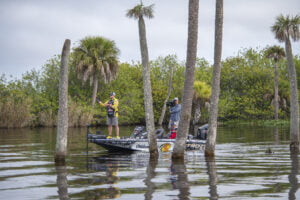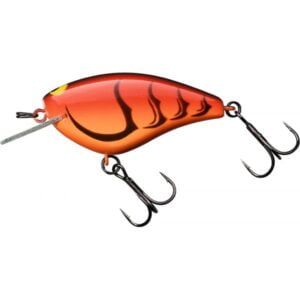 We all know that Bass Fishing is one of the most popular sports in the USA. The reason behind its popularity may be how enjoyable it is or how satisfactory it is to catch a bass fish. However, There are some common mistakes that are being made regularly by novel fishermen.
We all know that Bass Fishing is one of the most popular sports in the USA. The reason behind its popularity may be how enjoyable it is or how satisfactory it is to catch a bass fish. However, There are some common mistakes that are being made regularly by novel fishermen.
In this article, we’ve done some research to cover the most common mistakes made by anglers while bass fishing. We will also answer some frequently asked questions to help you more through your journey and make it more successful.
1.You Don’t Have To Rush Things Up
When you’re fishing bass, take your time and get to the bottom! Fishermen usually like a slow-moving lure that may be presented along the bottom on a smooth quiet summer day with minimal breeze and no clouds in the sky. Because of their natural motions and stealth-like presenting skills, shaky heads, Carolina rigs, and ned rigs are all great fish catchers on a smooth quiet summer day.
Without strong air movements, fish typically tire of bright, fast-moving crankbaits, spinners, or swimbaits, which is why successful fishermen take a spinning rod and sink their favorite finesse baits down the bottom.
You also need to wait for the best weather and season, fishing largemouth bass is best in Spring and Fall. [1]
2.Thinking That The Lure Is The Problem
It’s so simple to blame the lure when you’re not getting any bites, but that’s rarely the case. It’s not that they don’t want your lure most of the time; it’s something else; motion, speed, loudness, casting accuracy, fishing area, time of day. However, as anglers, we presume it is the lure and continue to change it in the hope that something else would work.
The problem is that repeatedly swapping lures shortens your time with a line in the water and accomplishes nothing. Consider altering something else first the next time you consider changing your lures.
However, this doesn’t eliminate the fact that you need the right lure in order to get fish.
3.Getting Afraid From Covers

Avoiding cover is a typical error made by younger fishermen. They’ve heard bass will be lurking there, but they don’t want to lose their new lure by getting tangled in lily pads, submerged logs, or dock pilings, so they avoid them like the plague and go for open water.
This is a major rookie error. Fish nearly always associate shelter or structure with safety, and they are multiple times more likely to be located there than in open water. You will lose a few lures if you cast to cover, but you will surely hook more fish. [2]
4.Slack & Lines
A Line Slack might cause your fish to get hurt or lost for a variety of reasons. The reasons include lack of attention, inexperience, or a windy day.
If you use a J hook and a bass swallows your bait before you feel it, it’s quite probable that the fish will become gut hooked, which means it may not survive if you try to remove the hook – cut you line and leave the hook in the fish it should rust out in a short period of time. Slack in the line also allows a bass to run with your bait, giving the fish time to realize it’s not genuine and spit it out before you can set the hook.
5.Not Understanding The Pattern
By saying pattern we mean the bass movements before getting caught. You should always ask yourself the following question:
- Did I get the fish from the bottom?
- Was it under cover?
- Was it on the dock’s windward side?
- Did it originate from the weed edge’s tip or pocket?
These types of questions will lead you to a pattern to increase your probability of getting more bass. [3]
6.Not Caring About Line Types
 The sizes and kinds of lines used in lures have a significant impact on their performance. The difference between an 8-pound line and a 12-pound line can be significant. Even on power fishing lakes like Toho in Florida or Sam Rayburn in Texas, you’ll need a large number of lines to adapt and catch fish regularly. To move your baits into productive depths, pull fish out of cover, or reduce line visibility, you’ll need the correct lines.
The sizes and kinds of lines used in lures have a significant impact on their performance. The difference between an 8-pound line and a 12-pound line can be significant. Even on power fishing lakes like Toho in Florida or Sam Rayburn in Texas, you’ll need a large number of lines to adapt and catch fish regularly. To move your baits into productive depths, pull fish out of cover, or reduce line visibility, you’ll need the correct lines.
7.Working In Noise
Because bass can hear quite well, many fishermen have scared fish they had no idea were there by chatting, laughing, hitting their boat, or bumping their paddle. Do you disagree with this statement? Due to the denser medium, sound travels four times quicker (3,170 mph) in water than it does in air (740 mph), is louder, and travels further.
Consider this the next time you go fishing and make some loud noise using your boat and any types of noise and check your results compared to some calm places. Thank me for this later.
FAQs
Does Focus affect my fishing results?
Most of us understand that fishing is a relaxing sport and hobby, but you still need to pay attention to your actions, at least some of the time. Have you ever noticed when you first started fishing, you always seem to do the best? I’m ecstatic to be out on the water (off shore or on a boat) fishing!
However, after some hours, you become tired, relaxed, and calmed, resulting in “FOCUS LOSS.” You should be fine if you remember to cast where you need to, jiggle your bait, and change up your lure every now and then if you’re not having much luck!
Where Should I Start as a beginner?
 If you’re a novice, sticking to simple techniques like crankbaits and plastics will help you learn and become a better angler. Buy a good baitcaster or get a decent spinning outfit to fish them and then progress on to different baits.
If you’re a novice, sticking to simple techniques like crankbaits and plastics will help you learn and become a better angler. Buy a good baitcaster or get a decent spinning outfit to fish them and then progress on to different baits.
Remember that bass are cold blooded, which means that their reaction in warm weather might be spectacular, but their reaction in cold weather can be slow and lazy.
The Bottom Line
Bass fishing is fun, but you have to do it right! In this article, we’ve covered 7 of the most common mistakes that we think run an obstacle for beginners. Some of the important ones are:
- Slow things up a little.
- don’t change your lures too soon.
- Always take care of lines.
If you’ve other advice or need some help, feel free to contact us! Happy bass fishing.

